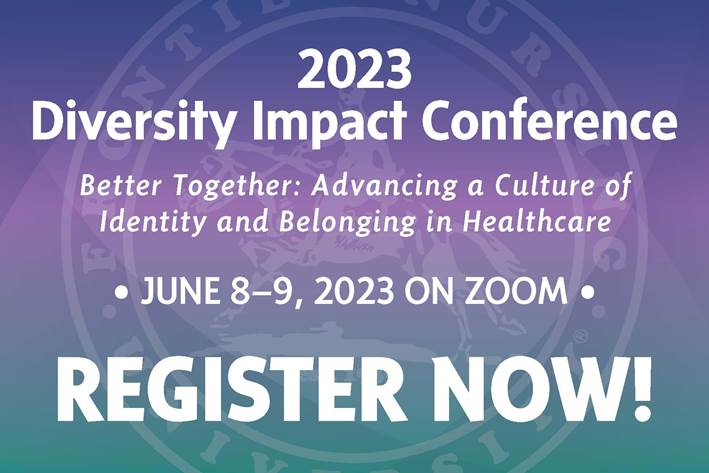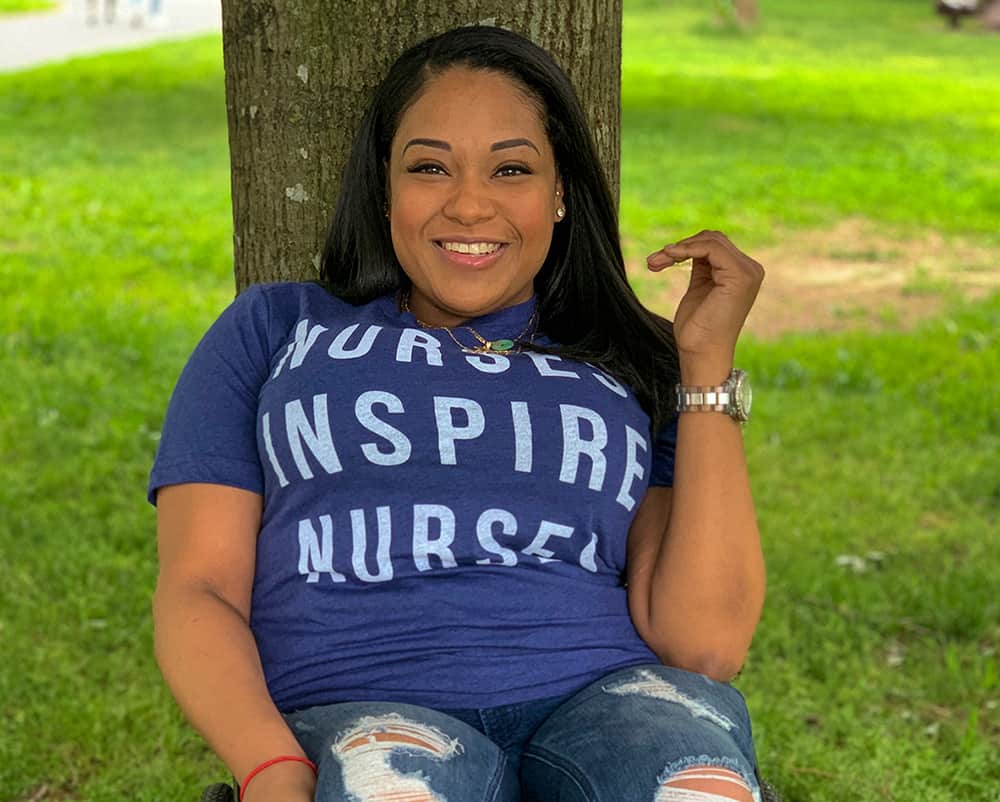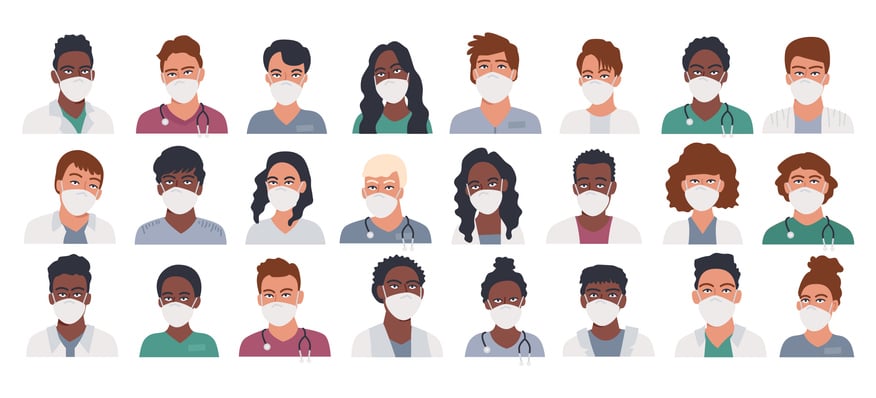Healthcare organizations and hospitals are making significant investments in initiatives focused on promoting Diversity, Equity, and Inclusion (DEI) in order to cultivate a dynamic and talented workforce for the future.
Johnson & Johnson has put its support behind two pilot programs aimed at setting Nurses up for success on campus and in healthcare settings.
The first program is a year-long leadership initiative developed by the National League for Nursing (NLN), an organization whose mission is to promote an inclusive nursing workforce and support nursing education. The NLN leadership program is designed to help students of color with a smooth transition from their last year of school to their first clinical job.
The second initiative is led by the American Association of Colleges of Nursing (AACN), which represents more than 865 nursing schools nationwide. The AACN has developed a detailed online survey for student nurses to measure their sense of belonging in classrooms. The goal is to use the survey results to foster a more inclusive and encouraging culture on campuses.
Mass General Brigham and UMass Boston’s Manning College of Nursing and Health Sciences announced an expanded collaboration to enhance the college’s Clinical Leadership Collaborative for Diversity in Nursing program.
With a $20 million investment — $10 million from Mass General Brigham and $10 million from UMass Boston — the goal is to recruit and retain Nursing students from underrepresented communities as they start their clinical rotations.
“Nurses are fundamental to the delivery of high-quality, compassionate healthcare to our patients,” said Dr. Anne Klibanski, president and CEO of Mass General Brigham. “There is an immense need to increase the pipeline of trained Nurses, with a concerted focus on increasing diversity among our trainees. This initiative is a powerful example of how collaboration can drive change to overcome monumental challenges in a meaningful way.”
The Cleveland Clinic, MetroHealth and University Hospitals officially signed the Impact Workforce Commitment with the overall goal to find new opportunities, maximize the hiring process and train and retain the area's diverse talent.
"Through this partnership with the Healthcare Anchor Network, we literally have committed to walk the talk," said Alan Nevel, Senior Vice President Chief Equity and Community Impact Officer for Metro Health System.
The health system is creating learn-and-earn programs to amplify and support diversity, as well as hosting community health and job fairs year-round.
The United Health Foundation, the philanthropic arm of UnitedHealth Group, will invest $100 million over the next decade to drive a more diverse healthcare workforce.
Patricia L. Lewis, the company's Chief Sustainability Officer, said "We don't have enough people entering the workforce. Given all of what we've been through in the last few years, you can see just how taxing that will be on the healthcare system."
Investing in a diverse workforce has numerous benefits and advantages such as:
Better patient care and outcomes: Diverse healthcare teams can provide more comprehensive and culturally competent care to patients from various backgrounds. When healthcare professionals understand the unique needs and perspectives of their patient populations, they can deliver more effective and personalized treatments, leading to better health outcomes.
“When you’re a Nurse with a diverse background, you are likely to bring a differentiated perspective to patient care," explains Lynda Benton, Senior Director of Global Community Impact Strategic Initiatives of Johnson & Johnson Nursing. "You may have broader and deeper insights into patient beliefs, attitudes, ethnicities and perceptions. When patients see Nurses and other members of the medical team who look like them, it can remove barriers, open up conversations and ultimately improve access to quality care."
Enhanced patient satisfaction: Patients feel more comfortable and valued when they see diversity represented in their healthcare providers. Feeling understood and respected by their healthcare team contributes to higher patient satisfaction and better patient-provider communication.
Reducing health disparities: In many healthcare systems, certain minority groups experience disparities in access to care, treatment options, and health outcomes. By promoting diversity and inclusion, hospitals aim to address these disparities and provide equitable care to all patients.
Attracting and retaining talent: High turnover rates are prevalent in this industry, attributed not only to the demanding workload but also the treatment professionals experience.
A Rutgers School of Nursing study found 63% of Nurses have experienced racism on the job. More than three-fourths of Black Nurses said racism negatively impacts their professional well-being.
People are more likely to join and stay in an inclusive organization where they feel accepted, supported, valued, and have equal opportunities for growth and advancement.
Fostering innovation and creativity: A diverse workforce brings together individuals with different backgrounds, experiences, and perspectives, creating a mix of ideas and insights. This diversity of thought can foster a culture of innovation and creativity within healthcare settings, leading to more effective problem-solving and decision-making.
When healthcare professionals from diverse backgrounds collaborate, they bring forth a wide range of perspectives and approaches to address complex healthcare challenges. They can draw upon their unique experiences and knowledge to develop innovative strategies and solutions that may not have been considered otherwise.
Reputation and community trust: Healthcare organizations that prioritize diversity and inclusion can build a positive reputation in their communities. Patients and community members are more likely to trust and support organizations that demonstrate a commitment to inclusivity.
Cultural competence and language access: A diverse workforce can help bridge language and cultural barriers between patients and providers. This can improve communication and ensure that patients receive the information and care they need, regardless of their language or cultural background.
Economic benefits: Diverse and inclusive healthcare organizations have been associated with improved financial performance. Studies have shown that companies and institutions with diverse leadership teams tend to outperform their peers financially.
From a health care perspective, lack of equity translates to higher costs. “When we exclude particular populations, decrease access, increase barriers, or provide subpar care, then at the end of the day, those people are going to utilize health care dollars at a much higher rate,” says Mary Fleming, MD, President of the nonprofit Reede Scholars, Inc. and Program Director of the Leadership Development to Advance Equity in Health Care program at the Harvard T.H. Chan School of Public Health.
Employee morale and productivity: Inclusive environments not only foster higher employee morale and satisfaction but also have a direct impact on the overall productivity and success of an organization.
When employees feel supported and included, they are more likely to develop a sense of loyalty towards the organization. They become advocates for the company's mission and values, which can positively impact employee retention and reduce turnover rates.
Additionally, inclusive environments promote effective communication and collaboration among team members. When employees feel comfortable expressing their thoughts and opinions, it leads to open and honest discussions. This fosters a culture of trust and transparency, enabling teams to work together more efficiently and effectively towards shared objectives.
Furthermore, inclusivity promotes diversity in leadership roles. Employees see individuals from diverse backgrounds in positions of authority, and become inspired and motivated to reach their full potential. This representation not only boosts employee morale but also helps to break down barriers and biases, leading to a more inclusive and equitable workplace for everyone.
Compliance and legal requirements: Many countries have laws and regulations that promote diversity and equal opportunity in the workplace. Hospitals and health systems invest in D&I to comply with these legal requirements and create a safe and inclusive environment for their employees.
Overall, investing in DEI is not just a social responsibility but also a strategic decision that can lead to improved patient care, better employee satisfaction, and enhanced organizational performance for health systems and hospitals.



 Versailles, Ky. – On June 8-9, 2023, Frontier Nursing University (FNU) will hold its
Versailles, Ky. – On June 8-9, 2023, Frontier Nursing University (FNU) will hold its 

 Hiring Nurses who reflect Diversity, Equity, and Inclusion (DEI) is an important step towards creating a healthcare system that is accessible and welcoming to all patients, regardless of their race, ethnicity, gender identity, sexual orientation, or any other characteristic.
Hiring Nurses who reflect Diversity, Equity, and Inclusion (DEI) is an important step towards creating a healthcare system that is accessible and welcoming to all patients, regardless of their race, ethnicity, gender identity, sexual orientation, or any other characteristic. 
 Diversity, Equity, and Inclusion (DEI) in the workplace is beneficial for employers, staff, and patients. More hospitals and health systems are recognizing the importance and are rolling out new DEI programs.
Diversity, Equity, and Inclusion (DEI) in the workplace is beneficial for employers, staff, and patients. More hospitals and health systems are recognizing the importance and are rolling out new DEI programs. 


 Age discrimination involves treating an applicant or employee less favorably because of his or her age,
Age discrimination involves treating an applicant or employee less favorably because of his or her age,